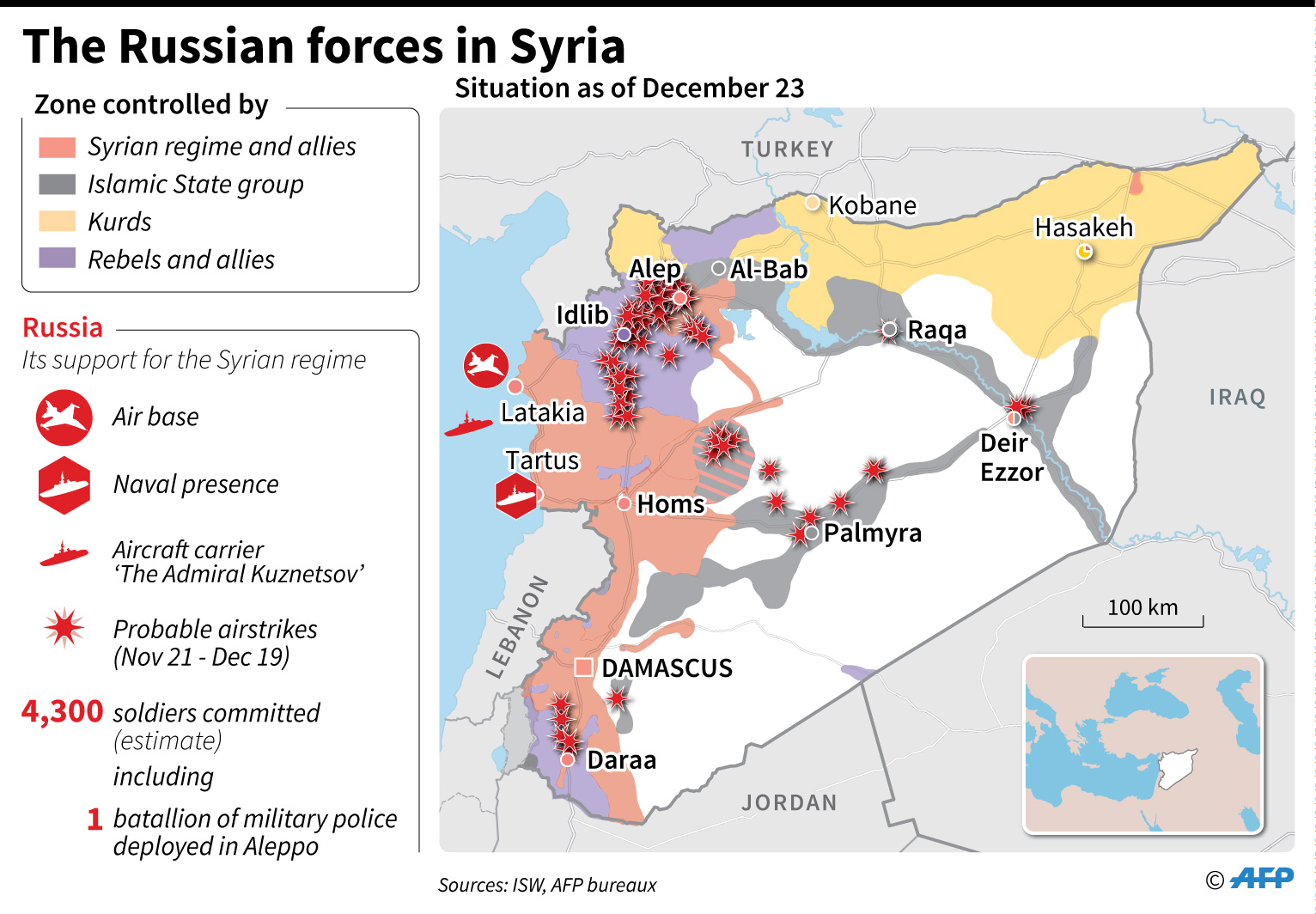
by Layal Abou Rahal
Agence France-Presse
BEIRUT, Lebanon (AFP) – A fragile calm was holding across Syria on Friday after a truce brokered by Russia and Turkey came into effect, a potentially major breakthrough after nearly six years of conflict.
There were reports of isolated violence, including clashes in central Hama province between government forces and jihadist factions, a monitor said.
The Syrian Observatory for Human Rights said there were casualties among regime forces in the clashes after midnight with jihadists near the town of Mahardeh.
The fighters were believed to be from a faction that did not sign the ceasefire announced Thursday by Russian President Vladimir Putin, and confirmed by Syria’s army and mainstream opposition bodies.
The Observatory reported other minor violations, including the firing of a single missile by regime forces in southern Daraa province, but said the truce was largely holding.
“There have not been any large violations,” said Observatory director Rami Abdel Rahman.
“From midnight until 8:00 am (0600GMT) there have been no civilian deaths recorded,” he added.
AFP correspondents on the ground in rebel-held territory in northwest Idlib province and Eastern Ghouta outside Damascus also reported calm after the truce began.
‘Real opportunity’
The ceasefire is the first nationwide truce to be implemented in the country since September, and is intended to pave the way for new peace talks in Kazakhstan sponsored by Russia and Turkey.
Syria’s government hailed the agreement as a “real opportunity” to find a political solution to the war, which has killed more than 310,000 people since it began with anti-regime protests in March 2011.
And despite being left out of the process, Washington also hailed the truce agreement as a “positive development”, saying it hoped it would bring new negotiations.
The agreement comes a week after the regime, which is backed by ally Russia, recaptured second city Aleppo in a major blow to rebel forces.
Putin said Damascus and the “main forces of the armed opposition” had inked a truce and a document expressing readiness to start peace talks.
Turkish President Recep Tayyip Erdogan described the agreement as a “historic opportunity” and urged states with influence on the ground to show “the necessary sensitivity” to ensure the truce held.
Syria’s conflict has become a complex multi-front battle, with a range of outside players intervening, including Russia, which launched a military campaign to bolster President Bashar al-Assad last year.
Putin said Friday he would now reduce Moscow’s military contingent in Syria, though he added Russia would continue to fight “terrorism” and maintain its support for the government.
And Erdogan also emphasised that Ankara would continue an operation it began in August targeting the Islamic State group and Kurdish fighters.
Moscow says seven key rebel groups have signed up to the deal, including the powerful Ahrar al-Sham faction, but the truce does not include jihadists such as IS or former Al-Qaeda affiliate Al-Nusra Front, now rebranded the Fateh al-Sham Front.
That could cause complications in areas like Idlib, where Fateh al-Sham is allied with rebel groups that have signed the deal.
Syria’s political opposition and rebels said the truce applied to all parts of the country.
“The agreement includes a ceasefire in all areas held by the moderate opposition, or by the moderate opposition and elements from Fateh al-Sham, such as Idlib province,” said Ahmed Ramadan, a member of the National Coalition opposition body.
Talks in Astana
Despite backing opposite sides in the conflict, Turkey and Russia have worked increasingly closely on Syria, brokering a deal this month to allow the evacuation of tens of thousands of civilians and rebel fighters from Aleppo.
They are now pushing for peace talks between Damascus and the rebels to start next month.
“Now we need to do everything for these agreements to come into force, for them to work, so that the negotiating teams that have been or are being formed promptly and as soon as possible arrive in Astana,” Putin said.
UN peace envoy Staffan de Mistura said he hoped the agreement would “pave the way for productive talks”, but also reiterated he wants negotiations mediated by his office to continue next year.
Russia and Turkey say the Astana peace talks are meant to supplement UN-backed peace efforts, rather than replace them.
Moscow says it is working with Turkey and key regime ally Iran, and will also seek to involve regional powers Egypt, Saudi Arabia, Qatar, Iraq and Jordan.
Washington is conspicuously absent from the new process, but Moscow said it hoped to bring US President-elect Donald Trump’s administration on board once he takes office in January.
A rebel official confirmed the truce deal was intended to pave the way for new talks, with the High Negotiations Committee that has represented the opposition at previous negotiations expected to participate.








